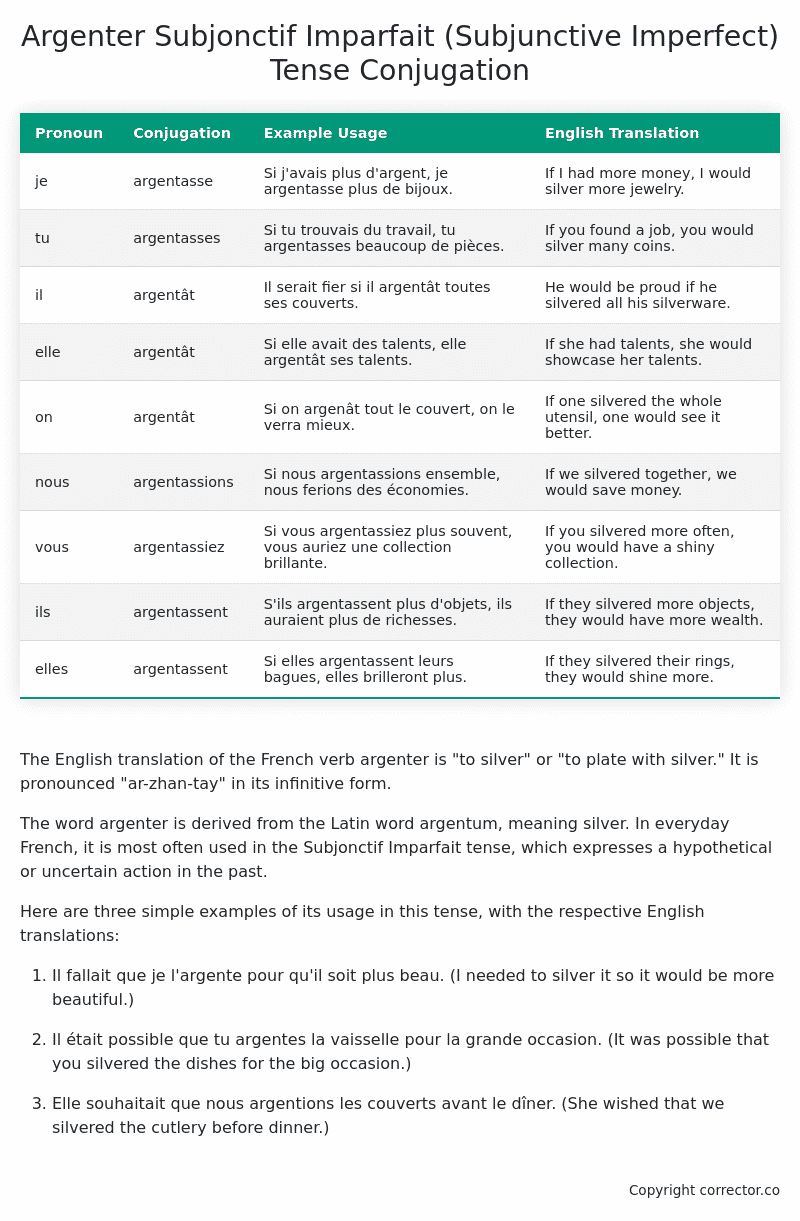Subjonctif Imparfait (Subjunctive Imperfect) Tense Conjugation of the French Verb argenter
Introduction to the verb argenter
The English translation of the French verb argenter is “to silver” or “to plate with silver.” It is pronounced “ar-zhan-tay” in its infinitive form.
The word argenter is derived from the Latin word argentum, meaning silver. In everyday French, it is most often used in the Subjonctif Imparfait tense, which expresses a hypothetical or uncertain action in the past.
Here are three simple examples of its usage in this tense, with the respective English translations:
-
Il fallait que je l’argente pour qu’il soit plus beau. (I needed to silver it so it would be more beautiful.)
-
Il était possible que tu argentes la vaisselle pour la grande occasion. (It was possible that you silvered the dishes for the big occasion.)
-
Elle souhaitait que nous argentions les couverts avant le dîner. (She wished that we silvered the cutlery before dinner.)
Table of the Subjonctif Imparfait (Subjunctive Imperfect) Tense Conjugation of argenter
| Pronoun | Conjugation | Example Usage | English Translation |
|---|---|---|---|
| je | argentasse | Si j’avais plus d’argent, je argentasse plus de bijoux. | If I had more money, I would silver more jewelry. |
| tu | argentasses | Si tu trouvais du travail, tu argentasses beaucoup de pièces. | If you found a job, you would silver many coins. |
| il | argentât | Il serait fier si il argentât toutes ses couverts. | He would be proud if he silvered all his silverware. |
| elle | argentât | Si elle avait des talents, elle argentât ses talents. | If she had talents, she would showcase her talents. |
| on | argentât | Si on argenât tout le couvert, on le verra mieux. | If one silvered the whole utensil, one would see it better. |
| nous | argentassions | Si nous argentassions ensemble, nous ferions des économies. | If we silvered together, we would save money. |
| vous | argentassiez | Si vous argentassiez plus souvent, vous auriez une collection brillante. | If you silvered more often, you would have a shiny collection. |
| ils | argentassent | S’ils argentassent plus d’objets, ils auraient plus de richesses. | If they silvered more objects, they would have more wealth. |
| elles | argentassent | Si elles argentassent leurs bagues, elles brilleront plus. | If they silvered their rings, they would shine more. |
Other Conjugations for Argenter.
Le Present (Present Tense) Conjugation of the French Verb argenter
Imparfait (Imperfect) Tense Conjugation of the French Verb argenter
Passé Simple (Simple Past) Tense Conjugation of the French Verb argenter
Passé Composé (Present Perfect) Tense Conjugation of the French Verb argenter
Futur Simple (Simple Future) Tense Conjugation of the French Verb argenter
Futur Proche (Near Future) Tense Conjugation of the French Verb argenter
Plus-que-parfait (Pluperfect) Tense Conjugation of the French Verb argenter
Passé Antérieur (Past Anterior) Tense Conjugation of the French Verb argenter
Futur Antérieur (Future Anterior) Tense Conjugation of the French Verb argenter
Subjonctif Présent (Subjunctive Present) Tense Conjugation of the French Verb argenter
Subjonctif Passé (Subjunctive Past) Tense Conjugation of the French Verb argenter
Subjonctif Imparfait (Subjunctive Imperfect) Tense Conjugation of the French Verb argenter (this article)
Subjonctif Plus-que-parfait (Subjunctive Pluperfect) Tense Conjugation of the French Verb argenter
Conditionnel Présent (Conditional Present) Tense Conjugation of the French Verb argenter
Conditionnel Passé (Conditional Past) Tense Conjugation of the French Verb argenter
L’impératif Présent (Imperative Present) Tense Conjugation of the French Verb argenter
L’infinitif Présent (Infinitive Present) Tense Conjugation of the French Verb argenter
Struggling with French verbs or the language in general? Why not use our free French Grammar Checker – no registration required!
Get a FREE Download Study Sheet of this Conjugation 🔥
Simply right click the image below, click “save image” and get your free reference for the argenter Subjonctif Imparfait tense conjugation!

Argenter – About the French Subjonctif Imparfait (Subjunctive Imperfect) Tense
Formation
Common Everyday Usage Patterns
Interactions with Other Tenses
Subjonctif Présent
Indicatif Passé Composé
Conditional
Conditional Perfect
Summary
I hope you enjoyed this article on the verb argenter. Still in a learning mood? Check out another TOTALLY random French verb conjugation!


